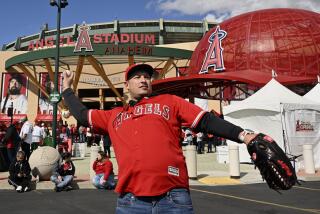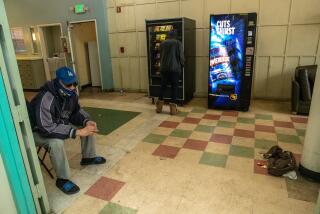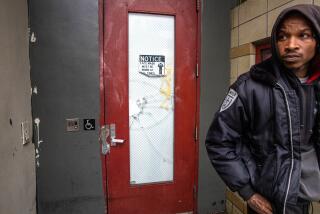Corruption-scarred Bell finds itself on better financial footing
Less than a year after state auditors warned that Bell faced possible insolvency, the city has seen a significant infusion of cash from settlements with firms it blamed for not preventing the corruption scandal that engulfed the town.
City officials said the $5.5 million in settlements, along with the sale of $15.5 million worth of city property, has left Bell on the strongest financial footing since the 2010 scandal, when the city defaulted on bonds it had issued and civic leaders first discussed the possibility of bankruptcy.
“Bankruptcy?” City Manager Doug Willmore said in an interview. “We’re not even close to that.”
The criminal cases against Bell’s former leaders are approaching an end with the recent guilty verdicts against former Assistant City Manager Angela Spaccia, the seventh person convicted in the municipal corruption case.
The city’s financial mess has been more intractable. In May, the state controller warned about the city’s finances, saying that Bell could end the year with a negative balance of $1.1 million in its general fund.
But in recent months, the city’s finances have improved to the point that Willmore said the city would have two years of reserves in the bank, a total of $21 million.
Bell has received $3 million from Mayer Hoffman McCann, a prominent accounting firm that audited the city’s books for years but failed to spot any wrongdoing.
The firm, which audited dozens of government agencies in California and has 30 offices nationwide, was fined $300,000 last year by the California Board of Accountancy and placed on two years’ probation.
State Controller John Chiang said Mayer Hoffman McCann was little more than a “rubber-stamp” on former City Manager Robert Rizzo and other leaders, who gave themselves oversized salaries.
The number of public entities in the state that Mayer Hoffman McCann audits has dropped from 67 in 2010 to 25 in 2012, according to figures provided by the controller’s office.
In a statement to The Times, Mayer Hoffman McCann said that neither the firm nor Bell was admitting liability.
“The settlement was entered into in recognition of the number and complexity of the claims, defenses, accounting and legal issues and evidence that litigation would have involved, and the substantial cost litigation would have required,” said Stephen Tully, the accounting firm’s attorney.
Willmore replied: “$3 million kind of speaks for itself.”
Bell also received $2.5 million to settle its malpractice lawsuit against former City Atty. Edward Lee and his former firm, Best, Best & Krieger.
Lee, who served as Bell’s city attorney from 1996 until the scandal broke in the summer of 2010, has been blamed by Spaccia and the five council members convicted of corruption this year for giving them bad legal advice.
A jury failed to reach a decision on some charges, and the council members are expected to be re-tried next year.
Lee testified during Spaccia’s trial that he had no idea about the huge paychecks that city officials were receiving or that Rizzo was lending city money without council approval. He said the city appeared to be doing well.
The former city attorney also testified that although his signature appeared on contracts for Rizzo, Spaccia and others, he had no recollection of signing them.
David Cantrell, the attorney who represented Best, Best & Krieger, called the agreement “a financial decision to get the case settled.”
Not everyone in Bell is happy with the settlements, which the City Council recently approved.
Violeta Alvarez, Bell’s mayor, said the accounting and law firms got off easily because the city didn’t have the funds to continue pressing the cases in court.
“They should be able to pay more,” she said. “I hope it comes out in the newspaper that they did wrong for the city of Bell.”
The biggest boon to Bell’s bottom line is the sale of two parcels near the 710 Freeway where a developer plans to build more than 800,000 square feet of industrial buildings.
A 14-acre piece of property was sold this month for $15.5 million. The same buyer, Pacific Industrial of Long Beach, also paid the city $29 million for a 25-acre parcel next door.
The city had defaulted on $35 million in bonds it issued to purchase the property during Rizzo’s tenure, and the short sale will allow the city to break even.
Willmore said the city may even have enough money to hire someone to help spur economic development. At the moment, the largest contributor to the city’s sales tax revenue is a gas station.
More to Read
Sign up for Essential California
The most important California stories and recommendations in your inbox every morning.
You may occasionally receive promotional content from the Los Angeles Times.











